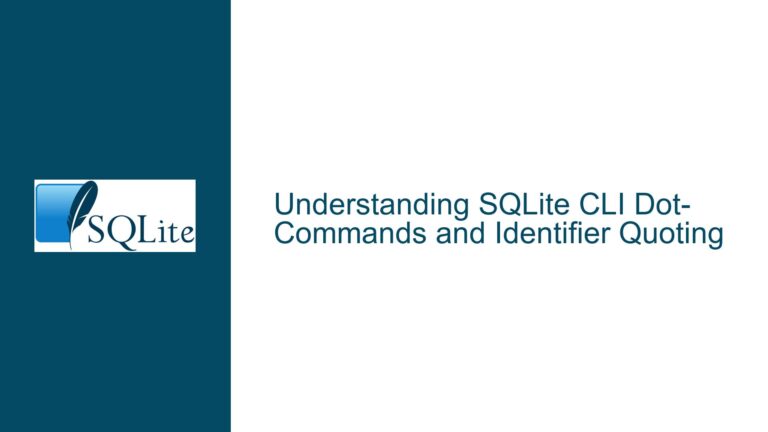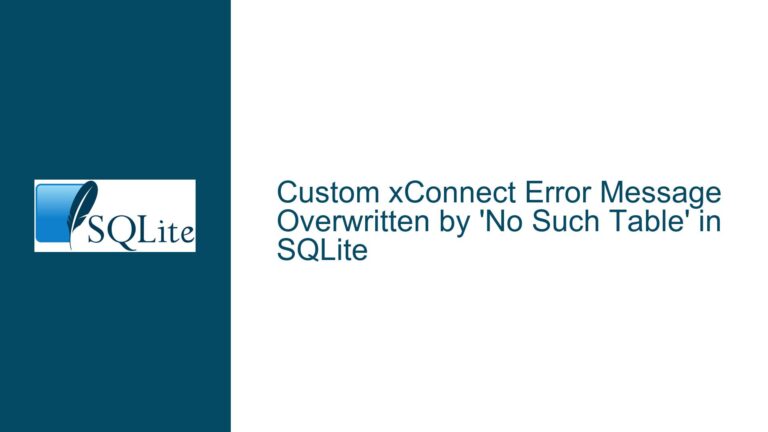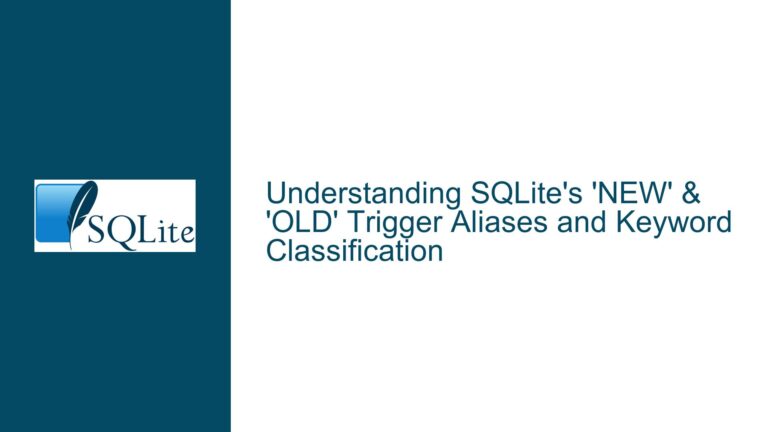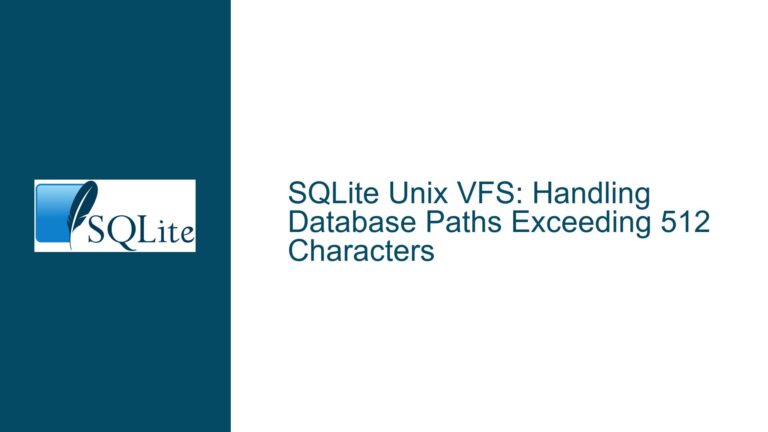Compiling SQLite for Apple Silicon and Intel macOS: Errors and Solutions
Issue Overview: Compilation Errors When Building SQLite for Universal macOS Binaries
When attempting to compile SQLite as a universal binary for macOS (supporting both Intel x86_64 and Apple Silicon arm64 architectures), developers often encounter a series of compilation errors and warnings. These issues arise due to a combination of incorrect compiler usage, misunderstandings about the SQLite amalgamation build process, and platform-specific nuances. The primary symptoms include:
Redefinition Errors: Errors such as
redefinition of 'sqlite3WhereTrace'occur because the SQLite amalgamation source code is being compiled as C++ instead of C. SQLite is written in C, and certain C constructs are not compatible with C++.Deprecated Warnings: Warnings like
conversion from string literal to 'char *' is deprecatedare triggered due to stricter type-checking in C++ mode. These warnings indicate that the code is being interpreted as C++, which is not the intended behavior.Linker Errors: Errors such as
Undefined symbols for architecture arm64andimplicit entry/start for main executableoccur when attempting to compile the SQLite amalgamation as a standalone executable. The amalgamation is designed to be built as an object file or library, not as an executable.Missing Dependencies: Errors like
undefined reference to 'dlopen'andundefined reference to 'pthread_create'indicate that necessary system libraries (e.g.,libdlandlibpthread) are not being linked during the build process.
These issues stem from a misunderstanding of the SQLite build process, particularly when targeting multiple architectures and platforms. The following sections will explore the root causes and provide detailed solutions.
Possible Causes: Missteps in Compiler Usage and Build Configuration
The compilation errors and warnings described above can be attributed to several key missteps:
Using
clang++Instead ofclang: SQLite is written in C, and usingclang++(the C++ compiler) to compile the amalgamation source code leads to errors. C++ has stricter type-checking and different rules for certain constructs, such as string literals and function declarations. Theclang++compiler treats the.cfile as C++ code, which is incompatible with SQLite’s C-based design.Attempting to Build an Executable: The SQLite amalgamation (
sqlite3.c) is not a standalone executable but a library. Attempting to compile it directly into an executable results in linker errors, such asUndefined symbols for architecture arm64. The amalgamation must be compiled as an object file or library and then linked with other components (e.g.,shell.c) to create an executable.Missing Compiler Flags and Dependencies: When building SQLite for macOS, certain compiler flags and system libraries are required. For example, the
-cflag is needed to compile the amalgamation into an object file, and libraries likelibdlandlibpthreadmust be linked explicitly. Omitting these flags and dependencies results in errors during the linking phase.Incorrect Handling of Universal Binaries: Building a universal binary for macOS requires specifying both
-arch arm64and-arch x86_64flags. However, these flags must be used correctly in conjunction with other build settings, such as-dynamiclibfor creating a dynamic library or-cfor generating object files. Misusing these flags can lead to incomplete or incorrect builds.Outdated or Incomplete Build Tools: The build process may fail if the development environment is not properly configured. For example, older versions of Xcode or missing command-line tools can cause issues when targeting newer architectures like Apple Silicon.
Troubleshooting Steps, Solutions & Fixes: Building SQLite Correctly for macOS
To resolve the compilation errors and successfully build SQLite as a universal binary for macOS, follow these detailed steps:
1. Use the Correct Compiler (clang Instead of clang++)
SQLite is written in C, so it must be compiled using a C compiler. Replace clang++ with clang in your build command. For example:
clang -arch arm64 -arch x86_64 -c -o sqlite3.o sqlite3.c
This command compiles sqlite3.c into an object file (sqlite3.o) without attempting to link it as an executable. The -c flag ensures that the compiler stops after the compilation phase and does not proceed to linking.
2. Compile the Amalgamation as an Object File or Library
The SQLite amalgamation is designed to be built as an object file or library, not as a standalone executable. To create a dynamic library for use in your project, use the following command:
clang -arch arm64 -arch x86_64 -dynamiclib -o libsqlite3.dylib sqlite3.c
This command generates a dynamic library (libsqlite3.dylib) that can be linked with other components of your application.
3. Link Required System Libraries
When building SQLite for macOS, certain system libraries (e.g., libdl and libpthread) must be linked explicitly. For example, if you are building the SQLite shell (shell.c), use the following commands:
clang -arch arm64 -arch x86_64 -c -o sqlite3.o sqlite3.c
clang -arch arm64 -arch x86_64 -c -o shell.o shell.c
clang -arch arm64 -arch x86_64 -o sqlite3 sqlite3.o shell.o -ldl -lpthread
These commands compile sqlite3.c and shell.c into object files and then link them together with the required libraries to create the SQLite shell executable.
4. Use the Autoconf Build System for Simplified Compilation
For a more streamlined build process, use the SQLite autoconf tarball. This approach automatically handles many of the complexities of building SQLite for multiple architectures. Follow these steps:
- Download the autoconf tarball from the SQLite website.
- Extract the tarball and navigate to the extracted directory.
- Run the following commands:
CC=clang CFLAGS="-arch x86_64 -arch arm64 -Os" ./configure
make
This approach generates a universal binary for the SQLite shell and library, simplifying the build process.
5. Specify Deployment Targets for Compatibility
To ensure compatibility with older macOS versions, specify the deployment target using environment variables and compiler flags. For example:
export MACOSX_DEPLOYMENT_TARGET=10.13
export LDFLAGS="-Wl,-macosx_version_min,10.13"
export CFLAGS="-mmacosx-version-min=10.13 -arch x86_64 -arch arm64 -Os"
./configure --enable-threadsafe
make
make install
These settings ensure that the compiled binary is compatible with macOS 10.13 and later, while also supporting both Intel and Apple Silicon architectures.
6. Enable Optional SQLite Features
If your project requires specific SQLite features (e.g., FTS4, RTREE, or session extensions), enable them using compiler flags. For example:
CC=clang CFLAGS="-arch x86_64 -arch arm64 -Os -DSQLITE_ENABLE_SESSION -DSQLITE_ENABLE_FTS4 -DSQLITE_ENABLE_RTREE -DSQLITE_DQS=0 -DSQLITE_ENABLE_COLUMN_METADATA" ./configure
make
These flags enable the desired features while optimizing the build for size (-Os).
7. Verify the Build Output
After completing the build, verify that the output files are correctly generated. For example, the autoconf build should produce the following files:
sqlite3: The SQLite shell executable.libsqlite3.dylib: The SQLite dynamic library.sqlite3.o: The compiled object file for the amalgamation.
Ensure that these files are present and correctly linked before integrating them into your project.
By following these steps, you can successfully compile SQLite as a universal binary for macOS, avoiding the common pitfalls and errors discussed in this guide. Whether you are building a library for use in a larger project or creating a standalone SQLite shell, these best practices will ensure a smooth and efficient build process.





